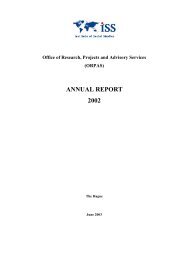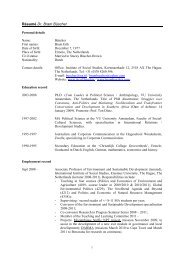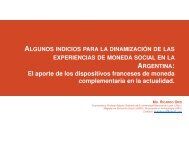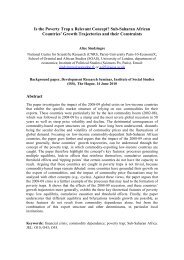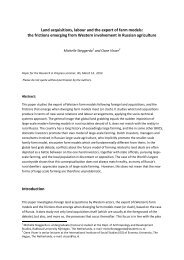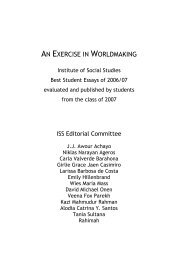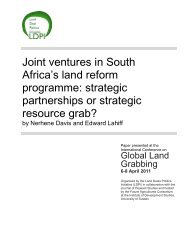AN EXERCISE IN WORLDMAKING 2009 - ISS
AN EXERCISE IN WORLDMAKING 2009 - ISS
AN EXERCISE IN WORLDMAKING 2009 - ISS
You also want an ePaper? Increase the reach of your titles
YUMPU automatically turns print PDFs into web optimized ePapers that Google loves.
176 MEL<strong>AN</strong>IE NEWELL<br />
tered around gender equity is the best way to provide transformative and<br />
sustainable SRH interventions. However, achieving gender equity implies<br />
social transformation, which can only occur when men recognize that<br />
women and men live interdependent lives and empowering women will<br />
also benefit them (UNFPA 2005: ch. 6). The ICPD program of action<br />
states that,<br />
Changes in both men’s and women’s knowledge, attitudes and behavior<br />
are necessary conditions for achieving the harmonious partnership of men<br />
and women. Men play a key role in bringing about gender equality since, in<br />
most societies, men exercise preponderant power in nearly every sphere of<br />
life ranging from personal decisions regarding the size of families to the<br />
policy and program decisions taken at all levels of Government (ICPD<br />
1994: 4.24).<br />
The shift in the SRH thinking paradigm allowed for new types of<br />
creative interventions to be introduced and financed with the consensus<br />
that such targeted interventions were now essential to not only SRH issues,<br />
but issues of poverty, violence, and inequalities impairing development<br />
and the general well-being of individuals and families.<br />
CHALLENGES PRESENTED <strong>IN</strong> MALE-<strong>IN</strong>VOLVEMENT CENTERED<br />
PROGRAMM<strong>IN</strong>G<br />
Interventions that see risky sexual behavior among men as biological,<br />
normal, and unchanging miss the opportunity to work with men and<br />
women to change gender stereotypes paving the way to tackling gender<br />
inequality (Greene 2000: 54). However, a holistic male-inclusive approach<br />
to achieving SRH rights is not easily developed; there are many<br />
layers of transformation that need to occur within society in order that<br />
male behavior is changed. Perhaps most essential and pivotal to changing<br />
gender inequalities and enabling men to be involved in family planning<br />
and SRH is the transformation of constructions of masculinity. Differing<br />
from one culture to another, the idea of what it means to be a ‘real man’<br />
has a huge impact on male involvement in the reproductive sphere<br />
(Connell 2007). For example, in Latin America and the Caribbean, cultural<br />
attitudes encourage “machismo” male-dominant behavior to persist,<br />
inhibiting gender equality conducive to promoting healthy sexual<br />
and reproductive lives for men and women (AGI 2004: 2). Specifically,<br />
in Jamaica, the dancehall music culture serves to reinforce dominant




